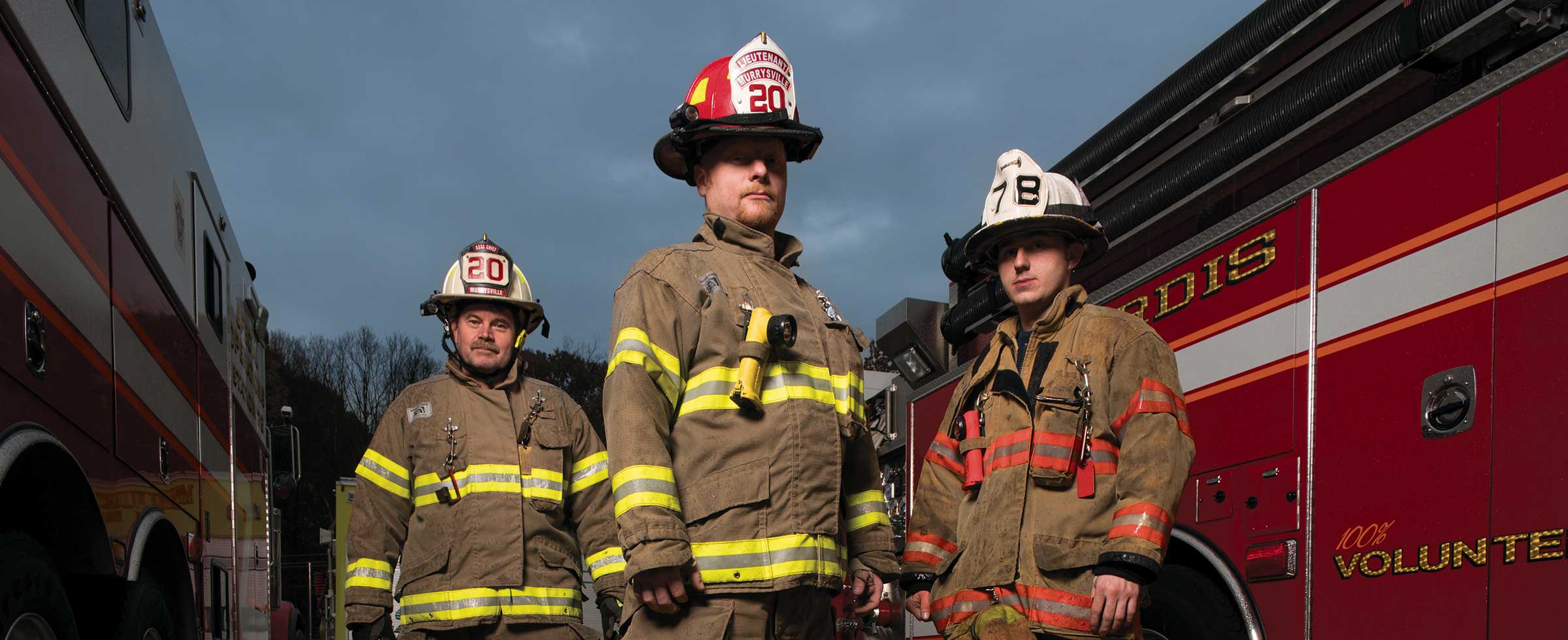Sounding the AlarmWestmoreland community foundation is a first responder to firefighter the recruitment crisis, with a $10,000 planning grant that leads to $4.3 million in federal funding.

Pictured, from left, Assistant Chief Bill Yant III and Lt. Patrick O’Mahony from Murrysville Volunteer Fire Company No. 1 and Deputy Chief Cody Paiano from Sardis Volunteer Fire Company Station 78. Their companies are two of the 60 volunteer fire departments benefiting from the SAFER Grant in Westmoreland County.
PENNSYLVANIA — specifically, native son Benjamin Franklin — created the concept of volunteer fire brigades, which have served small communities since 1736. But nearly three centuries later, rural communities like many in Westmoreland County are struggling to maintain that selfless tradition.
Faced with a sharp decline in volunteer firefighters, philanthropic and emergency services officials turned to a federal government program to make Westmoreland the proving ground for a novel recruitment strategy.
With a $10,000 planning grant from The Community Foundation of Westmoreland County, 60 fire departments made a joint application for federal Department of Homeland Security support. The result: A $10,000 investment leveraged a $4.3 million award from the Staffing for Adequate Fire and Emergency Response (SAFER) program, which will boost recruitment and training levels. The goal is to increase the number of volunteer firefighters by 500 countywide.
“Volunteer firefighting is a rich tradition,” says Phil Koch, executive director of the CFWC, “and it’s vital to every member of the community.” Longtime Penn Hills firefighter Rege Synan is part of that tradition, along with his grandfather, father, two brothers and son. And he’s concerned.
As a CFWC Advisory Board member and a charter member of the Allegheny County Hazardous Materials Response Team, Synan urged local fire companies to work on a countywide basis for the FEMA application to ensure there will be sufficient numbers of qualified firefighters to respond to emergencies. “Every little town needs to have trained firefighters, especially during daylight hours,” says Synan. “In the past, you could call two or three companies for backup. Yesterday, there was an incident that required 11 or 12.”
Westmoreland’s volunteer cohort has declined 16 percent over the past decade, threatening both community safety and community budgets. Pennsylvania’s fire companies would need $10 billion per year to replace volunteers with paid firefighters, according to state fire commissioner Tim Solobay. And, the demands on first responders have evolved far beyond cat-in-the-tree clichés. Only 10 percent of current calls fall into the structure fire category as firefighter duties now include water rescues, auto entrapments, natural gas and other hazardous material leaks, and drug overdoses.
“When I joined my local fire company in 1969, we ran 120 to 150 calls a year,” recalls Jerry Brant. His firm, Decoplan Associates, undertook the preliminary study funded by the CFWC. “If we went out the door, something was burning. We didn’t get calls for an overturned tank truck with methyl-ethyl bad stuff, or active shooter calls. Medical assistance was unheard of.”
In Westmoreland County, those calls are now routine. Responsible for two regional airports, 19 school districts, five rivers, 100 natural gas wells and drilling pads, as well as heavy traffic on two major interstate highways, firefighters answer more than 26,000 calls each year. That number continues to increase while volunteer levels hover near historic lows.
Like other southwestern Pennsylvania counties, Westmoreland’s population has shrunk over the past few decades. But shifts in employment patterns have had a bigger impact on firefighter recruitment. Decoplan found that firefighters who work in the Pittsburgh area but live in Westmoreland County spend a disproportionate amount of time commuting to and from work, and are less able to leave work for an emergency call than in years past.
“It used to be that many folks worked in our county’s industries — coal mines, coke plants,” says the CFWC’s Koch. “We had thousands of individuals working shifts. Now, they’re not in the neighborhood when a fire happens.” An increase in two-earner households and aging rural populations compounds the problem.
Federal support is essential. Brant says only two of Westmoreland’s 60 fire departments operate without any municipal funding, and most others ask their volunteers to raise funds through bingo nights, chicken dinners and gun bashes. Money for training, equipment, recruiting and retention is perennially scarce. The FEMA grant, part of $344 million that the agency will award nationally under SAFER this year, funds sophisticated training programs as well as marketing campaigns for recruitment.
Rather than offering one-time bonuses, fire companies will link incentives to progress through levels of training. Hempfield Township will offer scholarships for college or trade school tuition worth up to $10,000 to volunteers after their first year with the company. A life insurance benefit will be offered to those with second-tier certifications. Hempfield Township will act as fiscal agent for the project. Township manager Andy Walz is confident that volunteers will rally to the cause of protecting the community.
“In their recruitment campaign, the counties to the east of us set a goal of 300 recruits. They ended up with 500 at the end of the first year,” Walz reports. “So there’s a proven track record. There’s good reason to believe we’ll be successful.”
Original story appeared in Forum Quarterly - Fall 2017

